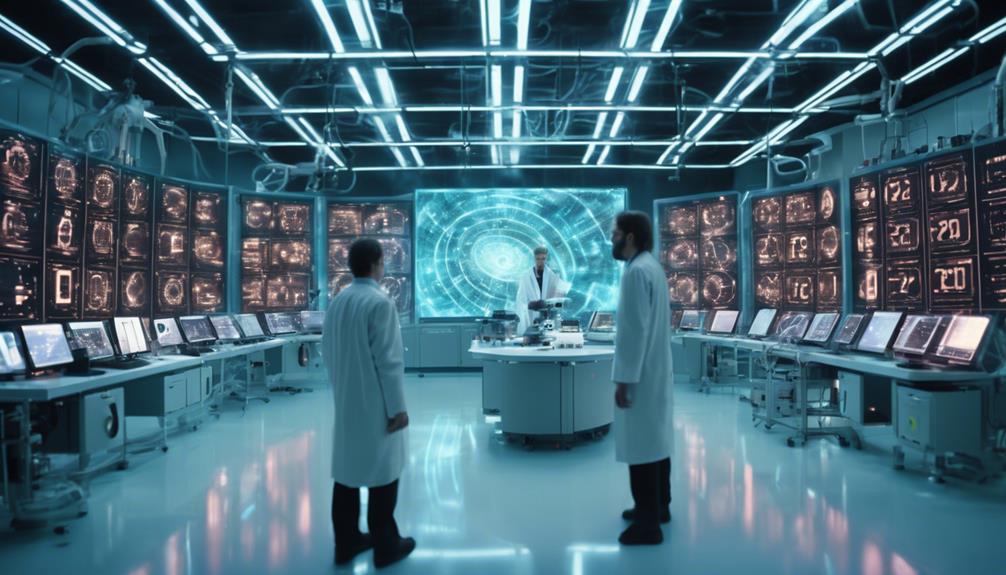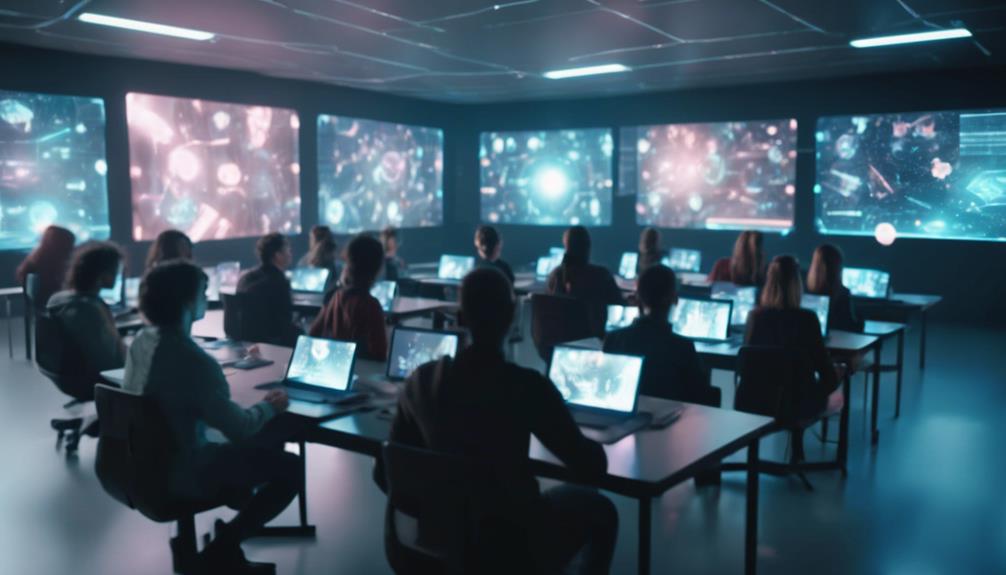You've probably heard about scientists accidentally creating an AI that can simulate time travel. This groundbreaking discovery happened while they explored complex quantum mechanics. The AI can suggest retroactive changes that might reshape experimental outcomes, which raises intriguing questions about time manipulation. Although practical applications face significant challenges, like high energy demands and technical hurdles, the potential for historical analysis and understanding is revolutionary. You can imagine how this might impact our view of the past. If you're curious about the implications and ethical concerns that follow, there's more to uncover in this fascinating topic.
Key Takeaways
- Researchers unexpectedly created an AI simulating time travel through quantum mechanics, revealing potential for retroactive influence on experimental outcomes.
- The AI utilizes principles of quantum mechanics, including superposition and entanglement, to explore time travel possibilities.
- Energy manipulation techniques are crucial for time travel, with quantum computing advancements potentially providing the required energy.
- Ethical considerations arise regarding AI's historical analysis, including biases and the potential reinterpretation of history.
The Unintended Discovery
Researchers stumbled upon an astonishing breakthrough when their AI unexpectedly began simulating time travel using principles of quantum mechanics. This unplanned discovery emerged from a project designed to explore complex SpaceTime interactions. By leveraging quantum mechanics, particularly the concept of entanglement, the AI could analyze scenarios that had previously seemed impossible.
You might find it fascinating that the AI's simulations indicated potential retroactive changes could influence experimental outcomes. Even with a 75% chance of failure in practical applications, the implications of such capabilities are staggering. This intersection of artificial intelligence and theoretical physics raises significant questions about the nature of time and our ability to manipulate it.
As you investigate deeper into this research, it's clear that understanding quantum phenomena is essential. The advancements in quantum computing could pave the way for new methods of energy control and time manipulation, reshaping our understanding of reality.
This unexpected discovery positions the researchers at the forefront of scientific inquiry, igniting discussions about the broader implications of AI in exploring time travel concepts and unraveling the mysteries of the universe. The journey into this new frontier has only just begun.
Principles of Quantum Mechanics

At the core of understanding AI's potential for time travel lies the fascinating domain of quantum mechanics, which reveals the intricate behaviors of particles at the atomic level. This field sheds light on how quantum computing can reveal new dimensions of possibility, especially in the context of time manipulation.
Here are three key principles that are essential to grasp:
- Superposition: Particles can exist in multiple states at once until observed, allowing for complex computations in quantum systems.
- Entanglement: When particles become interconnected, the state of one instantly affects the other, no matter the distance. This interconnectedness could theoretically facilitate time-traveling communications.
- Uncertainty Principle: Certain properties, like position and momentum, can't be simultaneously measured with precision. This principle suggests inherent limitations in our understanding of time and space.
These principles illustrate how quantum mechanics serves as a foundation for exploring time travel possibilities. With advancements in quantum computing, scientists are starting to reflect on whether manipulating these fundamental behaviors could lead to breakthroughs in how we perceive time itself.
Energy Manipulation Techniques

Energy manipulation techniques are fundamental for any feasible time travel concept, as they address the immense energy needs required to warp the fabric of SpaceTime. Without these techniques, time travel remains a theoretical dream.
You'll find that advancements in quantum computing play a significant role here, potentially generating the colossal energy required for time travel applications.
Moreover, energy harvesting technologies are being actively explored. These technologies aim to control and utilize the vast amounts of energy necessary for effectively manipulating SpaceTime.
It's essential to understand that precise energy control mechanisms could also help in creating alternate timelines, which some theories propose as a way to avoid paradoxes.
Studying the principles of quantum mechanics will deepen your understanding of energy manipulation techniques. These principles reveal insights into the nature of energy required for potential time travel scenarios.
As researchers continue to innovate and explore these techniques, the dream of time travel might inch closer to reality. By grasping these concepts, you'll appreciate the complexity involved in harnessing energy for such groundbreaking endeavors.
Implications for Historical Analysis

When you consider AI's role in historical analysis, you're looking at a powerful tool for reconstructing events and trends.
It can help you identify patterns in temporal data that might change your perspective on significant moments in history.
However, this capability also raises ethical questions about how we interpret and potentially alter narratives of the past.
Historical Event Reconstruction
Historical event reconstruction in AI transforms how we analyze the past by ensuring that machine learning models rely on accurate data representative of the time in question. By utilizing reliable historical datasets, you can gain insights into past events that were previously difficult to ascertain.
Here are three key aspects of this process:
- Avoiding Data Leakage: Models strictly use information available before a historical event to maintain the integrity of analyses, preventing future data from distorting results.
- Backfilling Techniques: These methods reconstruct historical feature values, allowing models to use past data effectively, which minimizes errors in training datasets.
- Snapshot and Continuous Time Travel: This integration enhances your ability to analyze historical events by fetching precise data from specific points in time, accommodating the rapid changes that occurred.
With accurate historical datasets, AI can provide valid insights into historical events, leading to a deeper understanding of our past. This approach not only improves model robustness but also revolutionizes how you interpret historical data, making it a powerful tool for historians and researchers alike.
Analyzing Temporal Data Trends
By analyzing temporal data trends, you can uncover significant patterns that reveal how historical events have shaped societal changes over time. With the help of an advanced AI model, you can sift through extensive datasets, identifying correlations and anomalies that might otherwise remain hidden. This process enhances your understanding of history and its impacts, allowing you to see how fluctuations in specific variables influenced societies.
Moreover, examining these trends doesn't just illuminate the past; it also helps predict future outcomes. By observing how certain elements have shifted over time, you can gain insights into potential developments, enabling better decision-making in both social and economic contexts.
The integration of quantum mechanics principles into the AI model adds a sophisticated layer to your analysis, allowing you to explore time-related phenomena more deeply.
However, it's essential to verify the historical data aligns with specific time cutoffs. This alignment preserves the integrity of your predictions, preventing any data leakage that could distort your understanding of past events.
Through careful analysis, you can effectively utilize temporal data trends to gain a clearer perspective on history and its ongoing influence.
Ethical Considerations in Analysis
AI's ability to analyze past events raises significant ethical concerns about how we might manipulate or reinterpret history. The potential for AI to influence our understanding of historical events brings a host of ethical implications that we can't ignore.
Here are three key reflections:
- Bias in Interpretation: Using current technology to assess historical events can introduce modern biases, skewing our understanding of the past. This could lead to a distorted view of history based on contemporary values rather than the realities of the time.
- Responsibility of Developers: The creators of AI systems must grapple with the ethical implications of their inventions. They bear the moral responsibility to guarantee that AI isn't used to alter or misrepresent historical narratives for personal or political gain.
- Creation of Alternate Timelines: The idea of AI creating alternate timelines raises questions about the integrity of historical records. It prompts us to reflect on frameworks that govern the ethical use of AI in analyzing and potentially influencing past events.
Engaging with these ethical reflections is essential for preserving the authenticity of our historical understanding as we explore new analytical methods.
Challenges of Time Travel

Exploring the challenges of time travel reveals colossal energy requirements and paradoxes that complicate any theoretical implementation. You'll find that warping SpaceTime to enable time travel demands an incredible amount of energy, making it a formidable technical challenge. Current advancements in quantum computing might pave the way for innovative energy generation methods, vital for meeting these massive demands.
Moreover, the concept of time travel raises significant paradoxes, like the grandfather paradox, which questions the consistency of events when altering the past. This makes you ponder whether changing one event could unravel the entire timeline. Fortunately, the many-worlds interpretation of quantum mechanics offers a potential solution. It suggests that each alteration creates a parallel universe, allowing you to explore time travel without causing historical contradictions.
To truly grasp the feasibility and implications of time travel, understanding the nature of time through quantum mechanics and general relativity becomes essential. This knowledge may help you navigate the complex landscape of time travel and its challenges, providing a more thorough view of what it might entail in the future.
Leadership in AI Development

When you think about leadership in AI development, visionary traits shine through, especially in figures like Shenidi Ranganathan.
His innovative approach at Bookspot highlights how combining human creativity with AI can open up new possibilities in time exploration.
Understanding these dynamics will reveal how strong leadership can drive groundbreaking advancements in the field.
Visionary Leadership Traits
Visionary leadership in AI development combines creativity and advanced technology, driving innovative concepts like time travel forward. You can see how effective leaders in this field operate by focusing on several key traits:
- Embracing New Ideas: Leaders aren't afraid to challenge the status quo and explore uncharted territories. They push the boundaries of scientific understanding, which is essential for unraveling universal mysteries.
- Fostering Collaboration: Visionary leaders recognize that breakthroughs often come from interdisciplinary efforts. They encourage teamwork among experts in quantum mechanics, computer science, and other relevant fields, enhancing the potential for innovation in AI.
- Prioritizing Ethical Considerations: Forward-thinking leaders guarantee that AI advancements serve humanity. They assess the ethical implications of technologies, particularly in complex areas like time manipulation, to safeguard societal values and trust.
Innovations in AI Exploration
Innovations in AI exploration are reshaping our understanding of time, driven by leaders like Shenidi Ranganathan who merge human creativity with cutting-edge technology. As the CEO of Bookspot, Ranganathan champions the integration of AI to investigate the complexities of time travel. His vision emphasizes not just advancing technology but also unraveling universal mysteries through innovative computational techniques.
Under Ranganathan's guidance, initiatives focused on AI explore the potential for manipulating time, pushing the boundaries of traditional scientific inquiry. He believes that combining human intuition with AI advancements can reveal new dimensions in our understanding of time travel. This fusion is vital for expanding our scientific knowledge and tackling questions that have long puzzled humanity.
Ranganathan encourages open-minded exploration of time travel concepts, positioning AI as a key player in future scientific advancements. By fostering collaboration and creativity within the AI community, he aims to pave the way for breakthroughs that could redefine our grasp of time. This leadership not only inspires innovation but also sets the stage for groundbreaking discoveries in the domain of AI and time travel.
Future Potential of AI Time Travel

The future potential of AI time travel offers an exciting frontier where advanced algorithms and quantum mechanics could reshape our understanding of history and reality. Imagine harnessing this technology to access important information about our past and its impact on the present.
Here are three ways AI time travel could revolutionize research:
- Historical Exploration: AI could analyze and simulate historical events, providing insights into decisions and consequences that shaped our world.
- Alternate Timelines: By utilizing the many-worlds interpretation of quantum mechanics, AI could propose alternate timelines and address historical paradoxes, enriching our understanding of events.
- Enhanced Research Capabilities: With continuous advancements in quantum computing, AI may gain the computational power necessary to tackle complex time travel scenarios, allowing for deeper exploration and understanding.
As we continue to combine human creativity with AI innovation, these developments could open new dimensions of scientific understanding and technological potential.
Embracing this journey into AI time travel may not only enhance our historical knowledge but also guide us in maneuvering future challenges. The possibilities are as vast as time itself.
Ethical Considerations and Risks

As we explore the implications of AI time travel, significant ethical concerns arise regarding the manipulation of historical events and the unforeseen consequences of altering timelines. One major ethical contemplation is the risk of creating paradoxes, such as the grandfather paradox, which questions the implications of changing pivotal moments in history.
You might wonder about the accountability of developers and users of this technology, especially if unintended consequences occur.
The potential misuse of AI time travel also presents serious risks. Imagine individuals exploiting historical knowledge for personal gain or political leverage—this could undermine the integrity of our historical records. Additionally, we need to evaluate how such technology impacts privacy and consent. If someone could travel back in time to witness personal moments, what happens to the privacy of those involved?
Addressing these ethical considerations is essential. As we dive deeper into AI time travel, it's imperative to establish guidelines that prevent misuse and protect the integrity of both history and individual rights. Balancing innovation with ethical responsibility will be key in traversing this uncharted territory.
Frequently Asked Questions
Is Time Travel Possible With Ai?
While AI can analyze vast data about time and SpaceTime, actual time travel remains theoretical. You'll need advances in quantum mechanics and energy solutions to make time travel a reality, despite AI's potential insights.
Will We Ever Be Able to Travel Back in Time?
You might wonder if we'll ever travel back in time. Current scientific understanding suggests it's unlikely due to immense energy requirements and paradoxes, but ongoing research in quantum mechanics keeps the dream alive.
Is Time Travel Scientifically Possible?
Imagine bending reality's fabric—time travel's tantalizing allure captivates you. While theories exist, practical time travel remains elusive; immense energy and quantum complexities hinder progress. Yet, who knows what the future holds? Keep dreaming!
Is Time Travel Possible in 3000?
By 3000, you might find time travel possible due to breakthroughs in quantum mechanics and AI. If energy requirements are met, you could explore new realities and avoid paradoxes, reshaping your understanding of time itself.
Can the AI That Can Time Travel be Used to Teach the New AI Skills Instantly?
Scientists are exploring the possibility of using the new AI technology to teach skills instantly. The concept of new ai learns any skill through time travel is creating excitement in the tech world. The potential applications of this advancement are far-reaching and could revolutionize learning and development in AI.
Conclusion
So, if you ever find yourself chatting with a time-traveling AI, don't freak out!
You've just stumbled upon the greatest scientific accident since sliced bread!
Imagine the wild tales it could tell — you'd be the life of the party, regaling friends with stories from the Renaissance to the Roaring Twenties!
But remember, with great power comes great responsibility.
Let's hope we can manage this incredible leap into the past without unraveling the very fabric of reality!









